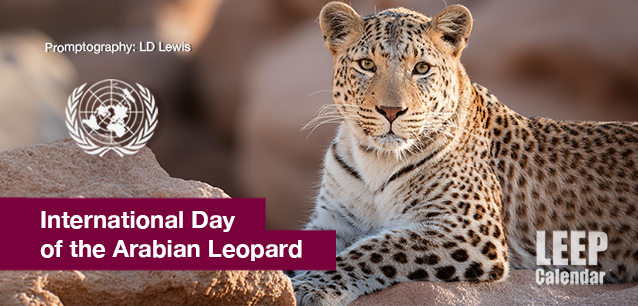 AD
AD
Today is: November 24
Scroll to explore events active on this date.
Additional Events on LEEP
LEEP INK FEATURES

August is Appropos
A toddler playing in the fountain at a park in Santa Fe, New Mexico—Photo LD Lewis. In August, we live through the Dog Days of Summer. It's hot and often humid, and those ...

September is Sassy
Can you hear that sigh of relief from parents worldwide? Yes! September marks the return of students to school, a global phenomenon. Preparations for the ACT and SATs begin earnestly for ...

OOH LA LA, October
October is the busiest month for events, with 5% more happening than in May, the second most eventful month. Sailing enthusiasts will be glued to the finals of this year's Am...
About International Day of the Arabian Leopard
Middle East/West Asia
Ends: Feb 10, 2024
DESCRIPTION:
CRITICALLY ENDANGERED, THE ARABIAN LEOPARD: A CALL TO ACTION
The International Day of the Arabian Leopard is an observance dedicated to raising awareness about the plight of the Arabian leopard and promoting efforts to conserve this critically endangered species. The event aims to highlight the importance of protecting the Arabian leopard's natural habitats, foster an understanding of its challenges, and mobilize support for conservation initiatives.
The Arabian leopard, a solitary and elusive big cat, is a unique inhabitant of the mountainous regions of the Arabian Peninsula. These rugged terrains, with their steep slopes and cliffs, provide the leopards with cover and vantage points for hunting, making them a fascinating species to learn about.
The primary purpose of this day is to draw global attention to the Arabian leopard's critical status, encourage effective conservation strategies, and engage local communities and international stakeholders in preserving the species. Their involvement is crucial in championing this event and ensuring the leopard's survival.
CONSERVATION STATUS AND PROTECTION MEASURES
The International Union for Conservation of Nature (IUCN) considered the Arabian leopard critically endangered. The species faces severe threats due to habitat loss, human-wildlife conflict, hunting, and prey base depletion. With an estimated population of fewer than 200 cats remaining, immediate and decisive action is needed to prevent their extinction.
Conservation efforts can include:
Habitat Protection
Preserving and restoring natural habitats ensures Arabian leopards have adequate space and resources to thrive.
Anti-Poaching Measures
Implement strict anti-poaching laws and enhance law enforcement to protect leopards from illegal hunting.
Community Engagement
Educate and involve local communities in conservation efforts to reduce human-wildlife conflict and promote coexistence.
Captive Breeding Programs
Support breeding programs in zoos and wildlife reserves to increase the population and potentially reintroduce individuals into the wild.
Research and Monitoring
Conduct scientific research to understand the leopards' ecology, behavior, and threats, and use this information to inform conservation strategies.
PARTICIPATING IN THE INTERNATIONAL DAY OF THE ARABIAN LEOPARD
People can participate in the International Day of the Arabian Leopard in various ways:
—Awareness Campaigns: Share information on social media, attend webinars, and participate in local events to spread awareness about the Arabian leopard.
—Donations and Fundraising: Contribute to or organize fundraisers for organizations dedicated to leopard conservation.
—Educational Programs: Engaging in or supporting educational programs that teach about the importance of biodiversity and conservation.
—Volunteer Work: Volunteering with conservation groups on habitat restoration, anti-poaching initiatives, and community outreach.
—Advocacy: Advocate for more robust wildlife protection policies and support legislation to conserve endangered species.
The International Day of the Arabian Leopard is a crucial reminder of the urgent need to protect one of the world's most endangered big cats. It is possible to create a sustainable future for the Arabian leopard through collective efforts and ensure that this magnificent species continues roaming the Arabian Peninsula's mountains.
VIDEOS
SUPPORTING DOCUMENTS
Currently, this event does not have supporting documents.
ADDITIONAL IMAGES
Currently, this event does not have supporting images.
Where would you like to go now?
 AD
AD


/footer-logo.svg)
